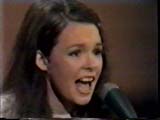 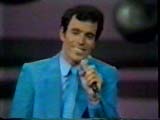 Finland, Norway, Portugal and
Sweden decided not to take part in the 1970 contest, thus reducing the number of
participating countries to twelve only. Since four countries had won the previous year,
lots were drawn to decide which of the winning organizations would host the Grand Prix.
The Netherlands won the draw and hosted the contest. A change was made in the voting
system to avoid possible ties. If two or more songs were awarded the same number of votes,
the winning songs would be immediately performed again and all of the juries, except for
those of the countries concerned, had to state by show of hands which song they preferred.
In the unlikely event of an ongoing tie where the voting could not decide between songs,
then, and only then, would the Grand Prix be awarded jointly to both. Performer Dana,
representing Ireland, won the Grand Prix with “All kinds of everything”, outshining
stars such as David Alexandre Winter, placed 8th with “Je suis tombé du ciel”,
representing Luxembourg; Julio Iglesias, placed 4th with the song “Gwendolyne”,
representing Spain; Henri Dès, who tied with Spain in 4th place with “Retour”,
representing Switzerland; Mary Hopkin, placed 2nd with “Knock, knock (Who’s there?)”
representing the United Kingdom, and Katja Ebstein, who took 3rd place with “Wunder gibt
es immer wieder”, representing Germany. Finland, Norway, Portugal and
Sweden decided not to take part in the 1970 contest, thus reducing the number of
participating countries to twelve only. Since four countries had won the previous year,
lots were drawn to decide which of the winning organizations would host the Grand Prix.
The Netherlands won the draw and hosted the contest. A change was made in the voting
system to avoid possible ties. If two or more songs were awarded the same number of votes,
the winning songs would be immediately performed again and all of the juries, except for
those of the countries concerned, had to state by show of hands which song they preferred.
In the unlikely event of an ongoing tie where the voting could not decide between songs,
then, and only then, would the Grand Prix be awarded jointly to both. Performer Dana,
representing Ireland, won the Grand Prix with “All kinds of everything”, outshining
stars such as David Alexandre Winter, placed 8th with “Je suis tombé du ciel”,
representing Luxembourg; Julio Iglesias, placed 4th with the song “Gwendolyne”,
representing Spain; Henri Dès, who tied with Spain in 4th place with “Retour”,
representing Switzerland; Mary Hopkin, placed 2nd with “Knock, knock (Who’s there?)”
representing the United Kingdom, and Katja Ebstein, who took 3rd place with “Wunder gibt
es immer wieder”, representing Germany. |
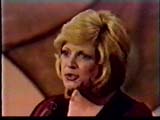 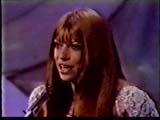 In 1971, the four
countries which had withdrawn the year before returned, accompanied by Malta who joined
the contest, thus restoring the number of participating countries to 18. Some of the rules
were modified, including one concerning the number of performers allowed on stage which
was limited to six. The voting system was completely revised, each participant now being
allowed to appoint only two jury members, one under 25 and the other over 25. They were
allocated ten points per song and could award from 1 to 10 votes to each. The winning
country was Monaco, represented by Séverine with “Un banc, un arbre, une rue”. Star
performer Serge Lama finished 9th with “Un jardin sur la terre”, representing France;
Katja Ebstein, returning for a second year, was placed 3rd with “Diese welt”,
representing Germany, and Peter, Marc and Sue came 11th with “Les illusions de nos 20
ans”, representing Switzerland. In 1971, the four
countries which had withdrawn the year before returned, accompanied by Malta who joined
the contest, thus restoring the number of participating countries to 18. Some of the rules
were modified, including one concerning the number of performers allowed on stage which
was limited to six. The voting system was completely revised, each participant now being
allowed to appoint only two jury members, one under 25 and the other over 25. They were
allocated ten points per song and could award from 1 to 10 votes to each. The winning
country was Monaco, represented by Séverine with “Un banc, un arbre, une rue”. Star
performer Serge Lama finished 9th with “Un jardin sur la terre”, representing France;
Katja Ebstein, returning for a second year, was placed 3rd with “Diese welt”,
representing Germany, and Peter, Marc and Sue came 11th with “Les illusions de nos 20
ans”, representing Switzerland. |
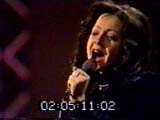 Monaco renounced staging the 1972 contest, thus
giving United Kingdom another opportunity to be the host broadcaster and this time it
decided to hold the contest in Edinburgh, Scotland. The winner of the contest was
Luxembourg, represented by Vicky Leandros with the song “Après toi”. The Irish
entrant made quite an impression, performing a song in Gaelic. Monaco renounced staging the 1972 contest, thus
giving United Kingdom another opportunity to be the host broadcaster and this time it
decided to hold the contest in Edinburgh, Scotland. The winner of the contest was
Luxembourg, represented by Vicky Leandros with the song “Après toi”. The Irish
entrant made quite an impression, performing a song in Gaelic. |
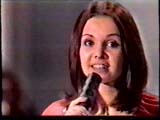 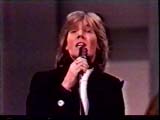 In 1973, Malta and Austria decided to withdraw from the
contest and Israel joined, thus requiring reinforced security. The rule on the language in
which songs were performed was changed to allow participants to choose the language in
which they wanted to sing. Luxembourg again finished in 1st place with “Tu te
reconnaîtras” performed by Anne-Marie David. Well-known singer Patrick Juvet,
representing Switzerland, came 12th with “Je vais me marier, Marie”, and Cliff Richard
was placed 3rd with “Power to all our friends”, representing the United Kingdom. In 1973, Malta and Austria decided to withdraw from the
contest and Israel joined, thus requiring reinforced security. The rule on the language in
which songs were performed was changed to allow participants to choose the language in
which they wanted to sing. Luxembourg again finished in 1st place with “Tu te
reconnaîtras” performed by Anne-Marie David. Well-known singer Patrick Juvet,
representing Switzerland, came 12th with “Je vais me marier, Marie”, and Cliff Richard
was placed 3rd with “Power to all our friends”, representing the United Kingdom. |
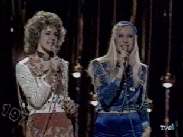 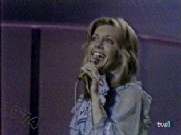 In 1974 Greece
joined the contest, while France had to withdraw a few days before due to the death of
President Georges Pompidou. This brought the number of participants down to 17. The rules
on juries were changed to put the number of jurors back to 10 per country. For national
juries a rule was introduced stating that an equal number of men and women was preferable,
including five members over 25 and five under 25, the minimum age being 16 and the maximum
60, with not less than 10 years between the two age ranges. They were allocated five
points per song and could award from 1 to 5 votes to each song. Sweden won the Grand Prix
that year with the song “Waterloo” performed by ABBA, who became the most popular
group in all of the contest’s history. Among the runners-up were well-known artists such
as Gigliola Cinquetti, representing Italy, placed 2nd with “Si”, Mouth and MacNeal,
representing the Netherlands, who came 3rd with “I see a star”, Olivia Newton-John
representing United Kingdom, placed 4th with “Long live love”, and Tina Reynolds,
representing Ireland, who came 7th with “Cross your heart”. In 1974 Greece
joined the contest, while France had to withdraw a few days before due to the death of
President Georges Pompidou. This brought the number of participants down to 17. The rules
on juries were changed to put the number of jurors back to 10 per country. For national
juries a rule was introduced stating that an equal number of men and women was preferable,
including five members over 25 and five under 25, the minimum age being 16 and the maximum
60, with not less than 10 years between the two age ranges. They were allocated five
points per song and could award from 1 to 5 votes to each song. Sweden won the Grand Prix
that year with the song “Waterloo” performed by ABBA, who became the most popular
group in all of the contest’s history. Among the runners-up were well-known artists such
as Gigliola Cinquetti, representing Italy, placed 2nd with “Si”, Mouth and MacNeal,
representing the Netherlands, who came 3rd with “I see a star”, Olivia Newton-John
representing United Kingdom, placed 4th with “Long live love”, and Tina Reynolds,
representing Ireland, who came 7th with “Cross your heart”. |
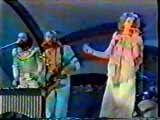 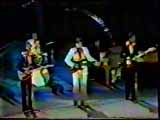 In 1975, all seventeen
countries from the previous year participated in the contest along with France,
Malta and Turkey. However, for reasons that were unclear, Greece decided to withdraw just
before the contest and this brought the total down to 19. The number of jurors in each
national jury was increased to eleven and these jury members could award 1 to 5 points per
song. However, the final votes to be given on TV were as follows: 12 points for the song
gaining most votes, 10 points for the song with the second largest number of votes, 8
points to the third song and so on down to 1 point for the song coming tenth in terms of
votes. The Netherlands won the Grand Prix with the song “Ding Dinge Dong” by the group
Teach-In. Second place was awarded to the United Kingdom with the song “Let me be the
one” interpreted by the Shadows, who became chart toppers in many European countries. In 1975, all seventeen
countries from the previous year participated in the contest along with France,
Malta and Turkey. However, for reasons that were unclear, Greece decided to withdraw just
before the contest and this brought the total down to 19. The number of jurors in each
national jury was increased to eleven and these jury members could award 1 to 5 points per
song. However, the final votes to be given on TV were as follows: 12 points for the song
gaining most votes, 10 points for the song with the second largest number of votes, 8
points to the third song and so on down to 1 point for the song coming tenth in terms of
votes. The Netherlands won the Grand Prix with the song “Ding Dinge Dong” by the group
Teach-In. Second place was awarded to the United Kingdom with the song “Let me be the
one” interpreted by the Shadows, who became chart toppers in many European countries. |
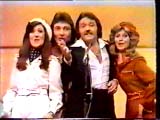 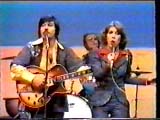 Sweden, Malta and Turkey withdrew from the 1976
contest but Austria and Greece joined, thus bringing the number of participants to 18.
There was a noticeable increase in the number of non-English speaking countries, such as
Austria, Finland, the Netherlands, Norway and Switzerland, opting to perform songs in
English. The United Kingdom won the Grand Prix with the song “Save your kisses for
me”, which was performed by the Brotherhood of Man and became a smash commercial hit,
selling over 6 million copies around the world. Top group Les Humphries came 12th with
“Sing, sang, song”, representing Germany, and Peter, Sue and Marc, participating in
the contest for the second time, were placed 4th with “Djambo Djambo”, representing
Switzerland. Sweden, Malta and Turkey withdrew from the 1976
contest but Austria and Greece joined, thus bringing the number of participants to 18.
There was a noticeable increase in the number of non-English speaking countries, such as
Austria, Finland, the Netherlands, Norway and Switzerland, opting to perform songs in
English. The United Kingdom won the Grand Prix with the song “Save your kisses for
me”, which was performed by the Brotherhood of Man and became a smash commercial hit,
selling over 6 million copies around the world. Top group Les Humphries came 12th with
“Sing, sang, song”, representing Germany, and Peter, Sue and Marc, participating in
the contest for the second time, were placed 4th with “Djambo Djambo”, representing
Switzerland. |
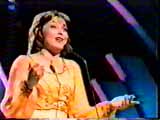 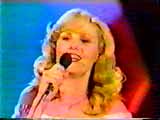 In 1977 Yugoslavia
withdrew from the contest and Sweden returned. The language rule was reinstated: all
participants had to performed in the language or one of the languages of their country.
However, both Belgium and Germany were allowed to enter an English-language song since
they had already chosen their entries before the rule was re-established. France won the
Grand Prix with “L’oiseau et l’enfant” performed by Marie Myriam, who became a big
star in France. Monaco finished 4th with the song “Une petite Française” by the
celebrity performer Michèle Torr, who was participating for the second time. In 1977 Yugoslavia
withdrew from the contest and Sweden returned. The language rule was reinstated: all
participants had to performed in the language or one of the languages of their country.
However, both Belgium and Germany were allowed to enter an English-language song since
they had already chosen their entries before the rule was re-established. France won the
Grand Prix with “L’oiseau et l’enfant” performed by Marie Myriam, who became a big
star in France. Monaco finished 4th with the song “Une petite Française” by the
celebrity performer Michèle Torr, who was participating for the second time. |
 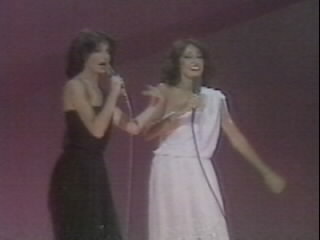 In the 1978 contest, Denmark and Turkey joined the 18
countries of the previous year, bringing the number of participants to 20. Israel
won the Grand Prix with the song “A-Ba-Ni-Bi”, which was performed by Ihzar Cohen and
the Alphabeta and became a big hit across Europe. Other star performers participated in
the contest, such as disco queen Baccara, who came 7th with “Parlez-vous français”,
representing Luxembourg, and Colm C.T. Wilkinson who was placed 5th with “Born to
sing” representing Ireland. Norway finished last, scoring zero points. In the 1978 contest, Denmark and Turkey joined the 18
countries of the previous year, bringing the number of participants to 20. Israel
won the Grand Prix with the song “A-Ba-Ni-Bi”, which was performed by Ihzar Cohen and
the Alphabeta and became a big hit across Europe. Other star performers participated in
the contest, such as disco queen Baccara, who came 7th with “Parlez-vous français”,
representing Luxembourg, and Colm C.T. Wilkinson who was placed 5th with “Born to
sing” representing Ireland. Norway finished last, scoring zero points. |
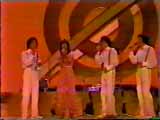 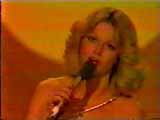 Turkey withdrew from the 1979 contest, bringing
the number of participants down to 19. Due to political problems in the city of Jerusalem,
where the contest was held, all the delegates and performers were kept under tight
security at all times, although nothing untoward occurred. That year everyone scored and
Israel won the Grand Prix for the second year in a row with the song “Hallelujah”,
performed by Gali Atari & Milk and Honey. Celebrity entrants included Sandra, placed
12th with “Colorado”, representing the Netherlands; Jeanne Mason, placed 13th with
“J’ai déjà vu ça dans tes yeux”, representing Luxembourg, and – participating
for the third time – Peter, Sue and Marc placed 10th with “Troedler und Co.”,
representing Switzerland. Turkey withdrew from the 1979 contest, bringing
the number of participants down to 19. Due to political problems in the city of Jerusalem,
where the contest was held, all the delegates and performers were kept under tight
security at all times, although nothing untoward occurred. That year everyone scored and
Israel won the Grand Prix for the second year in a row with the song “Hallelujah”,
performed by Gali Atari & Milk and Honey. Celebrity entrants included Sandra, placed
12th with “Colorado”, representing the Netherlands; Jeanne Mason, placed 13th with
“J’ai déjà vu ça dans tes yeux”, representing Luxembourg, and – participating
for the third time – Peter, Sue and Marc placed 10th with “Troedler und Co.”,
representing Switzerland. |


 Finland, Norway, Portugal and
Sweden decided not to take part in the 1970 contest, thus reducing the number of
participating countries to twelve only. Since four countries had won the previous year,
lots were drawn to decide which of the winning organizations would host the Grand Prix.
The Netherlands won the draw and hosted the contest. A change was made in the voting
system to avoid possible ties. If two or more songs were awarded the same number of votes,
the winning songs would be immediately performed again and all of the juries, except for
those of the countries concerned, had to state by show of hands which song they preferred.
In the unlikely event of an ongoing tie where the voting could not decide between songs,
then, and only then, would the Grand Prix be awarded jointly to both. Performer Dana,
representing Ireland, won the Grand Prix with “All kinds of everything”, outshining
stars such as David Alexandre Winter, placed 8th with “Je suis tombé du ciel”,
representing Luxembourg; Julio Iglesias, placed 4th with the song “Gwendolyne”,
representing Spain; Henri Dès, who tied with Spain in 4th place with “Retour”,
representing Switzerland; Mary Hopkin, placed 2nd with “Knock, knock (Who’s there?)”
representing the United Kingdom, and Katja Ebstein, who took 3rd place with “Wunder gibt
es immer wieder”, representing Germany.
Finland, Norway, Portugal and
Sweden decided not to take part in the 1970 contest, thus reducing the number of
participating countries to twelve only. Since four countries had won the previous year,
lots were drawn to decide which of the winning organizations would host the Grand Prix.
The Netherlands won the draw and hosted the contest. A change was made in the voting
system to avoid possible ties. If two or more songs were awarded the same number of votes,
the winning songs would be immediately performed again and all of the juries, except for
those of the countries concerned, had to state by show of hands which song they preferred.
In the unlikely event of an ongoing tie where the voting could not decide between songs,
then, and only then, would the Grand Prix be awarded jointly to both. Performer Dana,
representing Ireland, won the Grand Prix with “All kinds of everything”, outshining
stars such as David Alexandre Winter, placed 8th with “Je suis tombé du ciel”,
representing Luxembourg; Julio Iglesias, placed 4th with the song “Gwendolyne”,
representing Spain; Henri Dès, who tied with Spain in 4th place with “Retour”,
representing Switzerland; Mary Hopkin, placed 2nd with “Knock, knock (Who’s there?)”
representing the United Kingdom, and Katja Ebstein, who took 3rd place with “Wunder gibt
es immer wieder”, representing Germany.
 In 1971, the four
countries which had withdrawn the year before returned, accompanied by Malta who joined
the contest, thus restoring the number of participating countries to 18. Some of the rules
were modified, including one concerning the number of performers allowed on stage which
was limited to six. The voting system was completely revised, each participant now being
allowed to appoint only two jury members, one under 25 and the other over 25. They were
allocated ten points per song and could award from 1 to 10 votes to each. The winning
country was Monaco, represented by Séverine with “Un banc, un arbre, une rue”. Star
performer Serge Lama finished 9th with “Un jardin sur la terre”, representing France;
Katja Ebstein, returning for a second year, was placed 3rd with “Diese welt”,
representing Germany, and Peter, Marc and Sue came 11th with “Les illusions de nos 20
ans”, representing Switzerland.
In 1971, the four
countries which had withdrawn the year before returned, accompanied by Malta who joined
the contest, thus restoring the number of participating countries to 18. Some of the rules
were modified, including one concerning the number of performers allowed on stage which
was limited to six. The voting system was completely revised, each participant now being
allowed to appoint only two jury members, one under 25 and the other over 25. They were
allocated ten points per song and could award from 1 to 10 votes to each. The winning
country was Monaco, represented by Séverine with “Un banc, un arbre, une rue”. Star
performer Serge Lama finished 9th with “Un jardin sur la terre”, representing France;
Katja Ebstein, returning for a second year, was placed 3rd with “Diese welt”,
representing Germany, and Peter, Marc and Sue came 11th with “Les illusions de nos 20
ans”, representing Switzerland. Monaco renounced staging the 1972 contest, thus
giving United Kingdom another opportunity to be the host broadcaster and this time it
decided to hold the contest in Edinburgh, Scotland. The winner of the contest was
Luxembourg, represented by Vicky Leandros with the song “Après toi”. The Irish
entrant made quite an impression, performing a song in Gaelic.
Monaco renounced staging the 1972 contest, thus
giving United Kingdom another opportunity to be the host broadcaster and this time it
decided to hold the contest in Edinburgh, Scotland. The winner of the contest was
Luxembourg, represented by Vicky Leandros with the song “Après toi”. The Irish
entrant made quite an impression, performing a song in Gaelic. 
 In 1973, Malta and Austria decided to withdraw from the
contest and Israel joined, thus requiring reinforced security. The rule on the language in
which songs were performed was changed to allow participants to choose the language in
which they wanted to sing. Luxembourg again finished in 1st place with “Tu te
reconnaîtras” performed by Anne-Marie David. Well-known singer Patrick Juvet,
representing Switzerland, came 12th with “Je vais me marier, Marie”, and Cliff Richard
was placed 3rd with “Power to all our friends”, representing the United Kingdom.
In 1973, Malta and Austria decided to withdraw from the
contest and Israel joined, thus requiring reinforced security. The rule on the language in
which songs were performed was changed to allow participants to choose the language in
which they wanted to sing. Luxembourg again finished in 1st place with “Tu te
reconnaîtras” performed by Anne-Marie David. Well-known singer Patrick Juvet,
representing Switzerland, came 12th with “Je vais me marier, Marie”, and Cliff Richard
was placed 3rd with “Power to all our friends”, representing the United Kingdom.
 In 1974 Greece
joined the contest, while France had to withdraw a few days before due to the death of
President Georges Pompidou. This brought the number of participants down to 17. The rules
on juries were changed to put the number of jurors back to 10 per country. For national
juries a rule was introduced stating that an equal number of men and women was preferable,
including five members over 25 and five under 25, the minimum age being 16 and the maximum
60, with not less than 10 years between the two age ranges. They were allocated five
points per song and could award from 1 to 5 votes to each song. Sweden won the Grand Prix
that year with the song “Waterloo” performed by ABBA, who became the most popular
group in all of the contest’s history. Among the runners-up were well-known artists such
as Gigliola Cinquetti, representing Italy, placed 2nd with “Si”, Mouth and MacNeal,
representing the Netherlands, who came 3rd with “I see a star”, Olivia Newton-John
representing United Kingdom, placed 4th with “Long live love”, and Tina Reynolds,
representing Ireland, who came 7th with “Cross your heart”.
In 1974 Greece
joined the contest, while France had to withdraw a few days before due to the death of
President Georges Pompidou. This brought the number of participants down to 17. The rules
on juries were changed to put the number of jurors back to 10 per country. For national
juries a rule was introduced stating that an equal number of men and women was preferable,
including five members over 25 and five under 25, the minimum age being 16 and the maximum
60, with not less than 10 years between the two age ranges. They were allocated five
points per song and could award from 1 to 5 votes to each song. Sweden won the Grand Prix
that year with the song “Waterloo” performed by ABBA, who became the most popular
group in all of the contest’s history. Among the runners-up were well-known artists such
as Gigliola Cinquetti, representing Italy, placed 2nd with “Si”, Mouth and MacNeal,
representing the Netherlands, who came 3rd with “I see a star”, Olivia Newton-John
representing United Kingdom, placed 4th with “Long live love”, and Tina Reynolds,
representing Ireland, who came 7th with “Cross your heart”.
 In 1975, all seventeen
countries from the previous year participated in the contest along with France,
Malta and Turkey. However, for reasons that were unclear, Greece decided to withdraw just
before the contest and this brought the total down to 19. The number of jurors in each
national jury was increased to eleven and these jury members could award 1 to 5 points per
song. However, the final votes to be given on TV were as follows: 12 points for the song
gaining most votes, 10 points for the song with the second largest number of votes, 8
points to the third song and so on down to 1 point for the song coming tenth in terms of
votes. The Netherlands won the Grand Prix with the song “Ding Dinge Dong” by the group
Teach-In. Second place was awarded to the United Kingdom with the song “Let me be the
one” interpreted by the Shadows, who became chart toppers in many European countries.
In 1975, all seventeen
countries from the previous year participated in the contest along with France,
Malta and Turkey. However, for reasons that were unclear, Greece decided to withdraw just
before the contest and this brought the total down to 19. The number of jurors in each
national jury was increased to eleven and these jury members could award 1 to 5 points per
song. However, the final votes to be given on TV were as follows: 12 points for the song
gaining most votes, 10 points for the song with the second largest number of votes, 8
points to the third song and so on down to 1 point for the song coming tenth in terms of
votes. The Netherlands won the Grand Prix with the song “Ding Dinge Dong” by the group
Teach-In. Second place was awarded to the United Kingdom with the song “Let me be the
one” interpreted by the Shadows, who became chart toppers in many European countries.
 Sweden, Malta and Turkey withdrew from the 1976
contest but Austria and Greece joined, thus bringing the number of participants to 18.
There was a noticeable increase in the number of non-English speaking countries, such as
Austria, Finland, the Netherlands, Norway and Switzerland, opting to perform songs in
English. The United Kingdom won the Grand Prix with the song “Save your kisses for
me”, which was performed by the Brotherhood of Man and became a smash commercial hit,
selling over 6 million copies around the world. Top group Les Humphries came 12th with
“Sing, sang, song”, representing Germany, and Peter, Sue and Marc, participating in
the contest for the second time, were placed 4th with “Djambo Djambo”, representing
Switzerland.
Sweden, Malta and Turkey withdrew from the 1976
contest but Austria and Greece joined, thus bringing the number of participants to 18.
There was a noticeable increase in the number of non-English speaking countries, such as
Austria, Finland, the Netherlands, Norway and Switzerland, opting to perform songs in
English. The United Kingdom won the Grand Prix with the song “Save your kisses for
me”, which was performed by the Brotherhood of Man and became a smash commercial hit,
selling over 6 million copies around the world. Top group Les Humphries came 12th with
“Sing, sang, song”, representing Germany, and Peter, Sue and Marc, participating in
the contest for the second time, were placed 4th with “Djambo Djambo”, representing
Switzerland.
 In 1977 Yugoslavia
withdrew from the contest and Sweden returned. The language rule was reinstated: all
participants had to performed in the language or one of the languages of their country.
However, both Belgium and Germany were allowed to enter an English-language song since
they had already chosen their entries before the rule was re-established. France won the
Grand Prix with “L’oiseau et l’enfant” performed by Marie Myriam, who became a big
star in France. Monaco finished 4th with the song “Une petite Française” by the
celebrity performer Michèle Torr, who was participating for the second time.
In 1977 Yugoslavia
withdrew from the contest and Sweden returned. The language rule was reinstated: all
participants had to performed in the language or one of the languages of their country.
However, both Belgium and Germany were allowed to enter an English-language song since
they had already chosen their entries before the rule was re-established. France won the
Grand Prix with “L’oiseau et l’enfant” performed by Marie Myriam, who became a big
star in France. Monaco finished 4th with the song “Une petite Française” by the
celebrity performer Michèle Torr, who was participating for the second time.
 In the 1978 contest, Denmark and Turkey joined the 18
countries of the previous year, bringing the number of participants to 20. Israel
won the Grand Prix with the song “A-Ba-Ni-Bi”, which was performed by Ihzar Cohen and
the Alphabeta and became a big hit across Europe. Other star performers participated in
the contest, such as disco queen Baccara, who came 7th with “Parlez-vous français”,
representing Luxembourg, and Colm C.T. Wilkinson who was placed 5th with “Born to
sing” representing Ireland. Norway finished last, scoring zero points.
In the 1978 contest, Denmark and Turkey joined the 18
countries of the previous year, bringing the number of participants to 20. Israel
won the Grand Prix with the song “A-Ba-Ni-Bi”, which was performed by Ihzar Cohen and
the Alphabeta and became a big hit across Europe. Other star performers participated in
the contest, such as disco queen Baccara, who came 7th with “Parlez-vous français”,
representing Luxembourg, and Colm C.T. Wilkinson who was placed 5th with “Born to
sing” representing Ireland. Norway finished last, scoring zero points.
 Turkey withdrew from the 1979 contest, bringing
the number of participants down to 19. Due to political problems in the city of Jerusalem,
where the contest was held, all the delegates and performers were kept under tight
security at all times, although nothing untoward occurred. That year everyone scored and
Israel won the Grand Prix for the second year in a row with the song “Hallelujah”,
performed by Gali Atari & Milk and Honey. Celebrity entrants included Sandra, placed
12th with “Colorado”, representing the Netherlands; Jeanne Mason, placed 13th with
“J’ai déjà vu ça dans tes yeux”, representing Luxembourg, and – participating
for the third time – Peter, Sue and Marc placed 10th with “Troedler und Co.”,
representing Switzerland.
Turkey withdrew from the 1979 contest, bringing
the number of participants down to 19. Due to political problems in the city of Jerusalem,
where the contest was held, all the delegates and performers were kept under tight
security at all times, although nothing untoward occurred. That year everyone scored and
Israel won the Grand Prix for the second year in a row with the song “Hallelujah”,
performed by Gali Atari & Milk and Honey. Celebrity entrants included Sandra, placed
12th with “Colorado”, representing the Netherlands; Jeanne Mason, placed 13th with
“J’ai déjà vu ça dans tes yeux”, representing Luxembourg, and – participating
for the third time – Peter, Sue and Marc placed 10th with “Troedler und Co.”,
representing Switzerland.